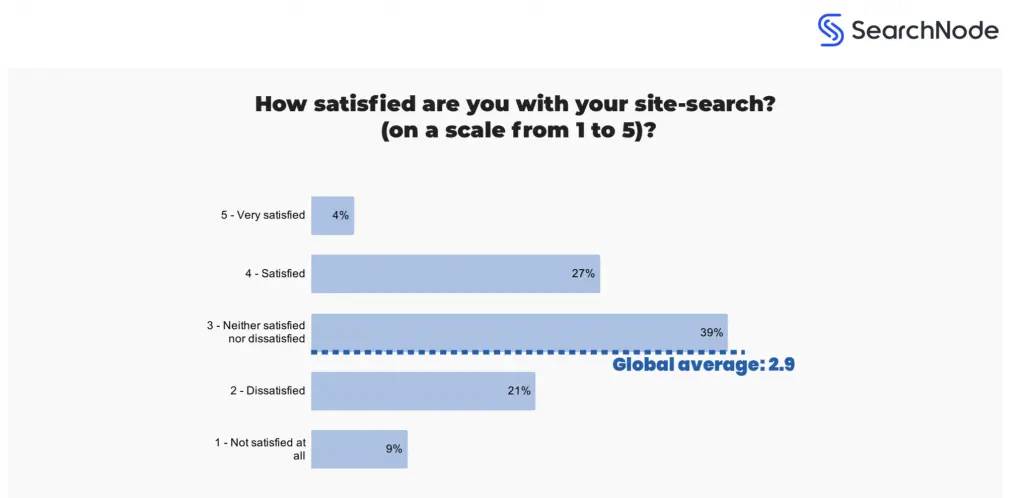
Leveraging digital marketing is essential for e-commerce sites, but site-search can be critical for driving conversion and for ensuring that your site’s visitors have a pleasant search experience. This, in turn, drives loyalty and return customers. According to the survey, a small majority (39%) of the respondents indicated level 3 of satisfaction, expressing moderate satisfaction. This matches what we’d expect given the high number of responding companies who reported that they’d focus on improving or implementing new site-search technology on an earlier question.
Only 4% claim to have the highest satisfaction with their site-search, and 27% more indicated that they are satisfied with their search. This suggests that most companies sense a healthy room for improvement at the very least, either because of perceived loss in conversion or customer complaints,

On the flip side, 30% in total are not satisfied at all or not really satisfied with their site-search infrastructure. This drove the overall average for all respondents to a mean score of 2.9 out of 5, underlined the survey. What is interesting. 50% built their site-search in-house while 44% use site-search technology or solution developed from the outside. These two answers comprised the vast majority of responses, said Searchnode. Between these, we can guess that a fair amount of both is not satisfactory for the respondents.
Very few respondents gave other answers, with the next highest oddly being those who lacked a site-search functionality at all – 4%. This is strange because visitors who use site-search technologies in some capacity generate 30-60% of all revenues. Those companies that don’t have site-search functionality are likely missing out on significant profits.

To dive deeper into the data, Searchnode examined the response spread among the companies from those who used in-house search technology and 3rd-party providers separately. Overall, third-party users were actually more satisfied than in-house search users by a significant amount, with a mean satisfaction rating of 3.2 out of 5 compared to a mean satisfaction rating of 2.7 out of 5 for those with in-house site-search technologies. This means that many in-house site-search functions are in need of improvement, along with plenty of third-party providers’ technologies.
In summary, it appears that most e-commerce companies have more difficulties with site-search they make themselves as opposed to trusting third-party providers or architects. Companies who build site-search in-house can experience many difficulties from finding qualified enough people to build the search to maintaining infrastructure, said Searchnode. On the contrary, third-party users may have some issues as those solutions could lack autonomy and flexibility, or don’t have some key features that they may require for their business. Besides, third-party site-search solutions are not always very scalable, which can be essential for growth.

| Cookie | Duration | Description |
|---|---|---|
| cookielawinfo-checkbox-analytics | 11 months | This cookie is set by GDPR Cookie Consent plugin. The cookie is used to store the user consent for the cookies in the category "Analytics". |
| cookielawinfo-checkbox-functional | 11 months | The cookie is set by GDPR cookie consent to record the user consent for the cookies in the category "Functional". |
| cookielawinfo-checkbox-necessary | 11 months | This cookie is set by GDPR Cookie Consent plugin. The cookies is used to store the user consent for the cookies in the category "Necessary". |
| cookielawinfo-checkbox-others | 11 months | This cookie is set by GDPR Cookie Consent plugin. The cookie is used to store the user consent for the cookies in the category "Other. |
| cookielawinfo-checkbox-performance | 11 months | This cookie is set by GDPR Cookie Consent plugin. The cookie is used to store the user consent for the cookies in the category "Performance". |
| viewed_cookie_policy | 11 months | The cookie is set by the GDPR Cookie Consent plugin and is used to store whether or not user has consented to the use of cookies. It does not store any personal data. |